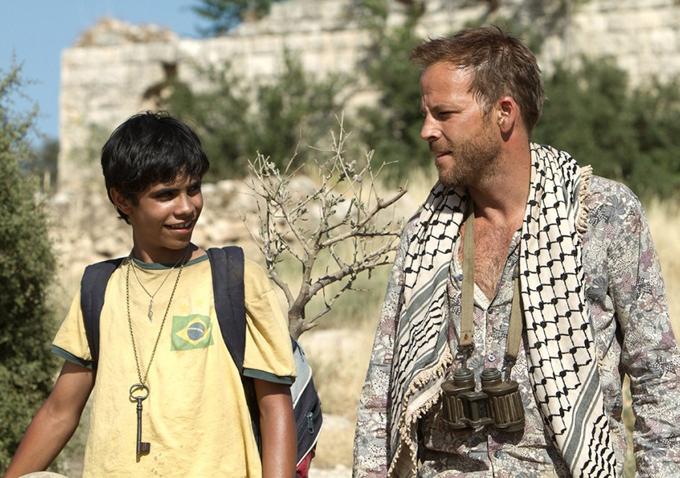 How affected you are by the closing scenes of “Zaytoun” may depend on your pre-existing knowledge of the Lebanese Civil War and the Israeli incursion in the country. Nothing’s spelled out in “Zaytoun” other than pointing out the date and location — Beirut, 1982 — but that would place the events depicted in the film shortly before the Sabra and Shatila massacre so brutally recalled in 2008’s “Waltz With Bashir.” It’s not something that directly impacts upon the story told on screen, but that the film assumes knowledge of will fundamentally affect the emotional impact its final act carries for different viewers.
How affected you are by the closing scenes of “Zaytoun” may depend on your pre-existing knowledge of the Lebanese Civil War and the Israeli incursion in the country. Nothing’s spelled out in “Zaytoun” other than pointing out the date and location — Beirut, 1982 — but that would place the events depicted in the film shortly before the Sabra and Shatila massacre so brutally recalled in 2008’s “Waltz With Bashir.” It’s not something that directly impacts upon the story told on screen, but that the film assumes knowledge of will fundamentally affect the emotional impact its final act carries for different viewers.
Eran Riklis’ film begins with the focus on 12-year-old Fahed (Abdallah El Akal) – a Palestinian boy living in a Beirut refugee camp. His contempt for Israel is intensified after his father is killed in an air attack (realized with extremely dated special effects), and so when an Israeli fighter pilot (Stephen Dorff) is shot down outside his camp, Fahed doesn’t think twice about taunting their new prisoner. But before long the two are striking a begrudging deal when Dorff’s Yoni offers to take Fahed back to his ancestral home in exchange for helping him escape.

It’s an extremely busy first act, and there are a lot of hurdles that Nader Rizq’s script needs to overcome before it can become the film it has set out to be. Yet in overcoming those plot hurdles the groundwork is laid fairly effectively and the two leads are well established by the time it settles down and becomes an unlikely buddy road movie. It’s then that the film significantly changes pace. Although the pair are trying to evade pursuers as they journey towards the border, any urgency or pace that “Zaytoun” had is then gone. The bulk of the plot has already been crammed in, the stakes have been established, all that is left to do is let these two characters from each side of the conflict spend time together and begin to understand each other.
The change of pace may be jarring, but the way the relationship between Yoni and Fahed is handled and gently developed is where the film’s primary strength lies. Whether or not the film’s positive message — that it is possible for individuals on either side of the Middle Eastern conflict to find common ground — may be deemed overly optimistic (if a little short of wish fulfillment) by some, there’s no doubt that in the context of the movie they sell it. The pair begin their journey full of mistrust and eager to antagonize one another, but their shared goal to return home is what makes it possible for their tolerance, camaraderie, and ultimately genuine care for one another’s well-being to blossom. That their mutual goal is also is the source of the conflict between their respective states is an irony best not forgotten.

Dorff and El Akal initially seem like a strange double act to hang a film around, and although that’s kind of the point, the pair still deserve credit both for the amount of chemistry they share and for their respective performances. El Akal’s performance comes across as incredibly naturalistic. He brings a naivety to the character that comes across both when he’s acting like a precocious, roguish young boy, or a helpless child filled with rage and frustration. It’s Dorff’s mature, restrained performance though that really anchors the film. It takes a few seconds to adjust to his Israeli accent (and to get past the fact that, in a film full of unknowns, that guy right there is Stephen Dorff from “Blade” et al.) but as soon as you do it’s hard to see him as anything other than great.
Despite all of the work that’s put into the central relationship, that doesn’t quite make up for that fact that said relationship is just about all that “Zaytoun” has to offer. Yoni and Fahad may be fleeing through minefields and dangerous terrain in the middle of a warzone, but there’s never any palpable sense of threat. The world they live in feels muted, and sadly that makes their physical journey seem rather unremarkable. In fact, for a long while, Riklis’ film has much the same feel. Sure, some of the photography is nice, but beyond the optimistic and crowd-pleasing central message there’s little else to cling on to. Perhaps it needed a little more context to convey that sense of threat, or perhaps there needed to be more reminders of the reasons that normally prevent Israelis and Palestinians from forming these kind of friendships beyond the first act, but sadly despite some great character work, the film’s journey comes across as pedestrian at best. [C]
This is a reprint of our review from the 2012 London Film Festival.

